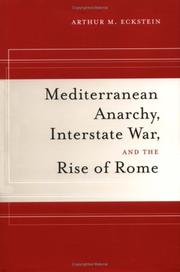| Listing 1 - 1 of 1 |
Sort by
|

ISBN: 9780520246188 0520246187 0520259920 0520932307 128235888X 1433701359 9786612358883 Year: 2006 Volume: 48 Publisher: Berkeley University of California press
Abstract | Keywords | Export | Availability | Bookmark
 Loading...
Loading...Choose an application
- Reference Manager
- EndNote
- RefWorks (Direct export to RefWorks)
This ground-breaking study is the first to employ modern international relations theory to place Roman militarism and expansion of power within the broader Mediterranean context of interstate anarchy. Arthur M. Eckstein challenges claims that Rome was an exceptionally warlike and aggressive state-not merely in modern but in ancient terms-by arguing that intense militarism and aggressiveness were common among all Mediterranean polities from ca 750 B.C. onwards. In his wide-ranging and masterful narrative, Eckstein explains that international politics in the ancient Mediterranean world was, in political science terms, a multipolar anarchy: international law was minimal, and states struggled desperately for power and survival by means of warfare. Eventually, one state, the Republic of Rome, managed to create predominance and a sort of peace. Rome was certainly a militarized and aggressive state, but it was successful not because it was exceptional in its ruthlessness, Eckstein convincingly argues; rather, it was successful because of its exceptional ability to manage a large network of foreign allies, and to assimilate numerous foreigners within the polity itself. This book shows how these characteristics, in turn, gave Rome incomparably large resources for the grim struggle of states fostered by the Mediterranean anarchy-and hence they were key to Rome's unprecedented success.
Rome - Foreign relations - 510-30 B.C. --- Rome - History - Republic, 510-30 B.C. --- Anarchism --- International relations --- War --- Armed conflict (War) --- Conflict, Armed (War) --- Fighting --- Hostilities --- Wars --- Military art and science --- Peace --- Coexistence --- Foreign affairs --- Foreign policy --- Foreign relations --- Global governance --- Interdependence of nations --- International affairs --- Peaceful coexistence --- World order --- National security --- Sovereignty --- World politics --- Anarchism and anarchists --- Anarchy --- Government, Resistance to --- Libertarianism --- Nihilism --- Socialism --- Rome --- History --- Anarchism. --- War. --- International relations. --- Anarchisme --- Guerre --- Relations internationales --- Histoire --- Relations extérieures --- allies. --- anarchy. --- ancient rome. --- ancient world. --- classical greece. --- classical world. --- foreign allies. --- hellenistic. --- international law. --- international politics. --- international relations. --- international. --- interstate. --- justice. --- law. --- legal issues. --- mediterranean. --- militarism. --- modern world. --- political science. --- politics. --- power struggles. --- realist. --- roman generals. --- roman history. --- violence. --- wartime.
| Listing 1 - 1 of 1 |
Sort by
|

 Search
Search Feedback
Feedback About UniCat
About UniCat  Help
Help News
News